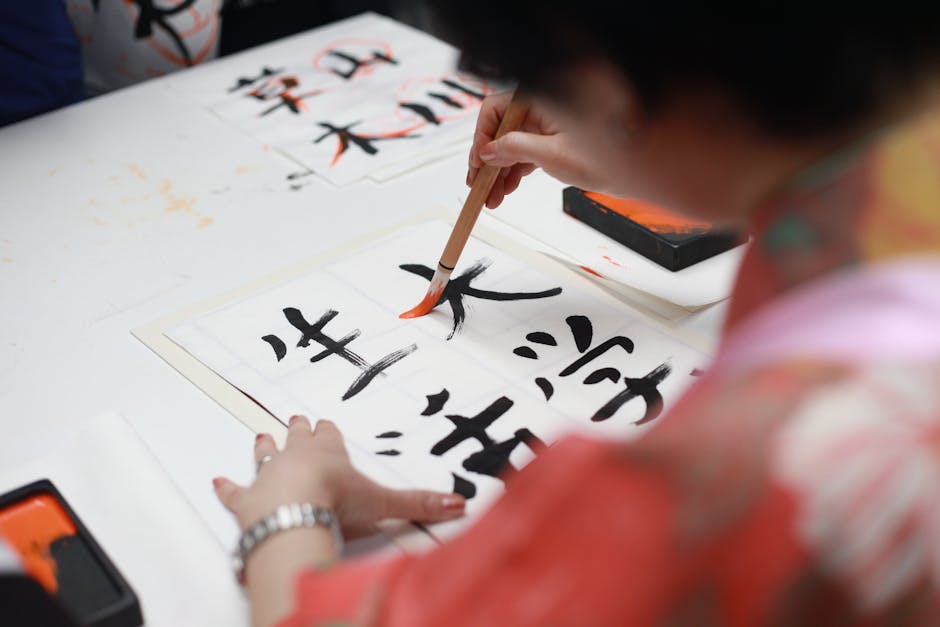Japanese Language School Interview: Decoding the Dream (Love Japan!)

Japanese Language School Interview: Decoding the Dream (Love Japan!)
Konnichiwa, style-seekers! Ever dreamt of strolling through Kyoto in a silken kimono, ordering sushi with the confidence of a local, or understanding the nuance behind a captivating manga panel? I know I have! For many of us who've fallen head-over-heels for the beauty and depth of Japanese culture, learning the language is more than just acquiring a skill – it's unlocking a portal to a richer, more vibrant experience. And the first step often involves… the infamous Japanese language school interview.
Now, I won't lie, the thought of facing a language school interview can feel a little intimidating. Images of intense teachers scrutinizing your every grammatical fumble might flash before your eyes. But fear not! It's actually a fantastic opportunity to showcase your passion for Japan, understand the school's philosophy, and ensure it's the perfect fit for your learning journey. Consider it less a test and more of a mutual introduction – a chance to see if your aesthetic sensibilities and learning style align with their unique approach.
Preparing for the Interview: More Than Just 'Hajimemashite'

Think of preparing for your interview as curating a beautiful bento box – each element needs to be carefully considered and harmoniously arranged. It's about presenting your enthusiasm and dedication in a way that resonates with the interviewers. So, where do we begin?
1. Research is Key (Like Finding the Perfect Matcha): Before you even think about practicing your self-introduction, delve deep into the school's website and social media. Understand their teaching methodology – is it traditional grammar-focused, or does it prioritize conversational fluency? What kind of cultural activities do they offer? Knowing this will help you tailor your answers and demonstrate genuine interest.
2. Mastering the Essentials (The Foundation of Your Kimono): While you don't need to be fluent, brushing up on basic Japanese phrases is crucial. Knowing how to introduce yourself (Hajimemashite, watashi wa… desu), express your interest (Nihongo o benkyou shitai desu), and ask simple questions (…wa nan desu ka?) will show initiative and respect.
3. Articulating Your 'Why' (The Story Behind Your Tea Ceremony): This is perhaps the most important part. Why do you want to learn Japanese? Don't just say "because I like anime." Dig deeper! Is it to better understand the philosophical underpinnings of Zen gardens? To communicate with your favorite ceramic artist in Mashiko? To explore the rich literary heritage of Japan? The more personal and heartfelt your reason, the more memorable you'll be.
4. Preparing Questions to Ask (Cultivating Your Inner Garden): Asking thoughtful questions demonstrates engagement and a genuine desire to learn. Don't just ask about tuition fees (though that's important too!). Consider asking about the teaching materials, the cultural exchange opportunities, or the teacher-student ratio. This shows you're invested in finding the right environment for your personal growth.
5. Dress the Part (Presenting Your Best Self): While a full kimono might be a tad much (unless it's a themed interview!), dressing respectfully is essential. Opt for clean, simple attire that reflects your personality. Think neat, comfortable, and professional – like a well-chosen outfit for visiting a traditional tea house. Cleanliness and attention to detail speak volumes.
Common Interview Questions: Navigating the Tatami Mat

Every interview is unique, but there are some questions you're likely to encounter. Think of them as familiar stepping stones on your path to Japanese fluency.
a. "Why do you want to study Japanese?" (The Heart of Your Motivation): This is your chance to shine! Be specific and passionate. Share your personal connection to Japanese culture. Did a particular book, film, or artwork spark your interest? Have you always admired the meticulous craftsmanship of Japanese artisans? Let your enthusiasm guide your answer.
b. "What are your goals for learning Japanese?" (Painting Your Future Landscape): Do you aspire to travel to Japan, work in a Japanese company, or simply enjoy Japanese media in its original form? Be realistic and ambitious. Showing you have clear goals demonstrates commitment and a willingness to work hard.
c. "What is your previous experience with language learning?" (Tracing Your Calligraphy Strokes): Have you studied other languages before? Even if you haven't, mention any efforts you've made to learn Japanese, such as using language learning apps, watching Japanese dramas with subtitles, or attending online workshops. This shows you're proactive and dedicated to self-improvement.
d. "How much time can you dedicate to studying?" (Allocating Space in Your Shoji Screen): Language learning requires consistent effort. Be honest about your availability and demonstrate that you're prepared to make time for studying, even with a busy schedule. Perhaps you can dedicate 30 minutes each day, or a few hours on weekends. This shows you're serious about your commitment.
e. "What are your strengths and weaknesses as a language learner?" (Acknowledging the Imperfections in Your Wabi-Sabi): This is a chance to show self-awareness. Are you a good memorizer? Are you comfortable speaking in front of others? Be honest about your weaknesses, but also highlight how you plan to overcome them. Perhaps you struggle with kanji, but you're willing to dedicate extra time to memorization.
f. "Do you have any questions for us?" (Nurturing the Seeds of Curiosity): This is your opportunity to gather more information and demonstrate your engagement. Ask questions about the curriculum, the teachers, the cultural activities, or the support services offered by the school. Avoid asking questions that are easily answered on the school's website. Show that you've done your research and are genuinely interested in learning more.
Beyond the Words: Showcasing Your 'Love Japan' Aesthetic

Your passion for Japanese culture shouldn't just be words – it should be a tangible expression of your personal style. Here's how to subtly infuse your 'Love Japan' aesthetic into the interview process:
1. Incorporate Japanese Design Principles (Finding Beauty in Simplicity): Channel the spirit of minimalism and functionality in your presentation. Keep your answers concise and well-organized. Avoid unnecessary jargon or complex language. Let the beauty of simplicity shine through.
2. Demonstrate an Appreciation for Japanese Art Forms (Honoring Tradition and Innovation): Mention your interest in specific Japanese art forms, such as calligraphy, origami, or ikebana. This shows a broader appreciation for Japanese culture beyond just language. It also demonstrates a sensitivity to aesthetics and a willingness to learn new skills.
3. Express Interest in Japanese Cuisine (Exploring the Flavors of Japan): Share your favorite Japanese dishes or restaurants. Discuss your interest in learning more about Japanese cooking techniques and ingredients. This shows a connection to Japanese culture through a sensory experience.
4. Highlight Your Awareness of Japanese Etiquette (Showing Respect and Consideration): Familiarize yourself with basic Japanese etiquette, such as bowing, using honorifics, and avoiding direct eye contact. Even small gestures of respect can make a big difference.
5. Bring a Small, Thoughtful Gift (Expressing Gratitude and Appreciation): While not always necessary, a small, thoughtful gift can be a nice gesture of appreciation. Consider bringing a box of traditional Japanese sweets or a handcrafted item that reflects your personality. Be sure to present the gift with both hands and express your gratitude.
Handling Nervousness: Finding Your Inner Zen Garden

It's perfectly normal to feel nervous before an interview. But remember, you're not alone! Here are some tips for managing your anxiety and staying calm:
1. Practice Mindfulness and Meditation (Cultivating Inner Peace): Take a few minutes to meditate or practice mindfulness before the interview. Focus on your breath and let go of any anxious thoughts. Visualize yourself succeeding and feeling confident.
2. Prepare Thoroughly and Practice Your Answers (Building a Solid Foundation): The more prepared you are, the more confident you'll feel. Practice answering common interview questions out loud, either to yourself or with a friend. This will help you feel more comfortable and articulate your thoughts more clearly.
3. Remember Your 'Why' (Reconnecting with Your Motivation): When you start to feel overwhelmed, remind yourself why you want to learn Japanese. Reconnect with your passion for Japanese culture and let that fuel your confidence.
4. Focus on Connecting with the Interviewers (Building Bridges of Understanding): Remember that the interviewers are people too. Focus on building a connection with them and showing them your genuine enthusiasm for learning Japanese. Don't be afraid to smile and be yourself.
5. Embrace Imperfection (Finding Beauty in the Flaws): It's okay to make mistakes. Language learning is a journey, not a destination. Don't be afraid to stumble over your words or make grammatical errors. The important thing is to keep trying and to show your willingness to learn.
After the Interview: Nurturing the Seeds You've Planted

The interview is over, but your journey has just begun! Here's how to follow up and make a lasting impression:
1. Send a Thank You Note (Expressing Gratitude and Appreciation): Send a thank you note to the interviewers within 24 hours of the interview. Express your gratitude for their time and reiterate your interest in the program. A handwritten note is a nice personal touch, but an email is also acceptable.
2. Reflect on Your Performance (Learning and Growing from the Experience): Take some time to reflect on your performance. What did you do well? What could you have done better? Use this feedback to improve your interviewing skills for future opportunities.
3. Be Patient (Allowing Time for Growth): The school may take some time to make their decision. Be patient and avoid contacting them repeatedly. Trust that they will contact you when they are ready.
4. Continue Learning (Nurturing Your Passion): Even if you don't get accepted into your first choice of school, don't give up on your dream of learning Japanese. Continue studying on your own and exploring Japanese culture. There are many other opportunities available, and with perseverance, you'll eventually find the perfect fit.
Learning Japanese is a beautiful and rewarding journey. By preparing thoroughly for your language school interview, showcasing your passion, and embracing the spirit of 'Love Japan,' you'll be well on your way to unlocking a world of cultural richness and personal growth. Ganbatte! (Do your best!)
So go forth, embrace the challenge, and remember – learning Japanese is not just about mastering grammar, it's about opening your heart to a world of exquisite beauty and profound meaning. Sayōnara for now, and may your journey be filled with wonder!
Post a Comment